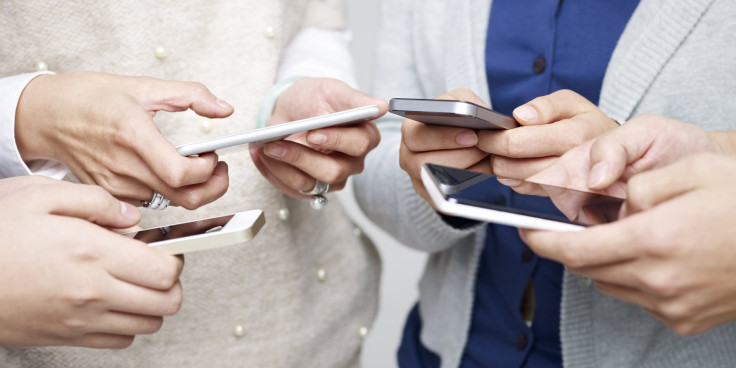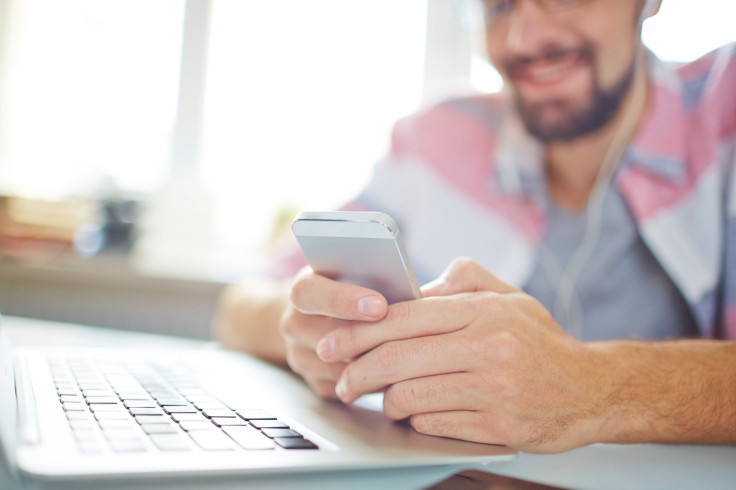Smartphones, Tablets, And TVs: All This Screen Time Is Hurting Your Mind And Body

Lately, I’ve been spending a lot of time catching up on TV shows and movies. I’ll sit on my couch, hook up my laptop to my TV, and binge watch for a few hours. Sometime during the first hour though, my phone comes out. This happens every time. I’m texting friends, checking my social media accounts, googling information about the show I’m watching. By the end of the marathon, there are major holes in the storyline. I usually end up watching these things twice.
Over the past few years, an increasing number of people have been sharing their screen time with other screens. Both the Pew Research Center and Nielsen found in 2012 and 2013, respectively, that about half of smartphone owners use their phones while watching TV. Then, this past April, management consulting and technology services company Accenture found that number rose to about 57 percent. When it came to using other devices, like laptops and tablets, that number rose again to 87 percent of people. That’s a lot of people splitting their attention between devices.
A lot of this research is useful to marketers. In fact, just this past week, a study from The Ohio State University found that even when companies’ brand messages were featured in sports broadcasts, people whose attention was split between two screens were less likely to remember them. This happened both when broadcasters mentioned the brand and when the brands’ logos were printed into the nets behind goalposts.
“Viewers don’t even remember that your brand was there on TV because they were busy posting on Facebook or Twitter, or reading email,” said lead author Jonathan Jensen, a doctoral student in sport management in the university’s Department of Human Sciences. “This should provide a measure of pause to brand marketers who are spending a lot of money to get their products integrated into live sporting events and other TV shows.”
No. Rather, these findings should provide a measure of pause to those who split their attention between screens. I’m not saying this because I want everyone to see what’s being advertised; we already see enough ads on a daily basis. I say that because on their own, multitasking and screen time hurt the brain and body, but together, they strike an even stronger one-two punch to our health.
More Screens, Less Productivity
We’re living in a digital age right now, and the amount of time we spend on electronic devices continues to climb. In 2009, the average American adult spent about eight hours a day staring at screens, including TVs, cell phones, and even GPS devices. Today, that number surpasses 11 hours. Kids, meanwhile, spend an average of seven hours a day looking at various screens despite recommendations of no more than two hours a day. For people whose careers depend on computers, those numbers are surely higher.
A lot of that screen time may be work-related, but it trickles over into our personal lives, too. Whether it’s keeping up with the latest trends or simply catching up on whatever we might have missed in social media, devoting so much time to our devices can breed digital addiction, which many people have come to call nomophobia — the fear of being without a mobile device. In some people, this fear is so strong that they begin to experience physical symptoms, such as back pain.
Perhaps the most obvious physical symptom of too much screen time is eye strain. In a study, 61 percent of adults said they experienced eye problems such as dryness, irritation, and blurred vision. Even worse, those who were younger, and therefore more likely to be using electronic devices, were more likely to say this affected them — 70 percent of Millennials, compared to 57 percent of baby boomers and 63 percent of Gen Xers. These symptoms can, in turn, cause headaches.
Meanwhile, all the blue light emitted from screens suppresses the body’s sleep hormone melatonin, throwing off the circadian rhythm, and causing a person to lose sleep. This can then lead to a range of effects, from poorer work performance (because the brain can’t function optimally) to weight gain.

The irony in all this is that while our eyes and bodies are being damaged, we might not even be reaching our full potential when it comes to the information we’re consuming. Focusing on more than one screen dilutes our attention, and weakens our brains. Study upon study has shown that multitaskers typically perform worse on tasks than those who only stick to one and then move to others once they’ve finished. The reason: multitaskers have more trouble organizing their thoughts and filtering out irrelevant information. Even when they’re ready to move from one task to the next, they do so at a slower pace. Their brains just work less effectively.
Effectiveness most likely drops because both multitasking and excessive screen time have been linked to changes in the brain. Specifically, both have been linked to reductions in gray matter, the regions of the brain where processing occurs, and the breaking down of white matter, which relays information from neurons in one brain region to those in another. In turn, this negatively affects decision making, the way we store and process new information, our stress levels, and a wealth of other cognitive processes vital to attention, memory, emotion, and executive function.
What’s more, both have also been shown to trigger reactions in the brain similar to addiction. Each time new information is processed through a screen, or when starting a new task, the feel-good neurotransmitter dopamine fires off. In other words, our brains are rewarding us for losing focus and finding new distractions. Going back to that irony, we answer text messages, laugh at some funny Instagram posts, and check emails, all while stimulating our brains and reaping the rewards. But when someone asks us what happened on last night’s Game of Thrones, we have no idea, despite sitting through the entire thing.
Chances are these same behaviors carry over to the workplace too, where they can stifle creativity and deep thought. Even people who try to stay focused might experience the effects, as thoughts remain erratic and it’s still difficult to wrangle in focus. If there’s an email sitting in an inbox, research has shown a person’s effective IQ can drop by about 10 points — they just can’t stop thinking about what that email says. That same research even found the cognitive losses from multitasking were greater than those of smoking marijuana, specifically with regard to memory and concentration.
“The technology is rewiring our brains,” brain scientist Nora Volkow, director of the National Institute of Drug Abuse, told The New York Times. She compared our propensity to check our devices more to sex and food than drugs and alcohol, saying that they’re essential but counterproductive if overused.
Unplugging Is Good For the Mind and Body
Thankfully, the brain is elastic enough to bounce back. Unplugging as much as possible, whether it’s during your weekend or after work, will allow your brain to recharge and refocus. Though it may be difficult at first, the time you take off will give you more opportunities to notice when you’re bored — this is also when you should resist the urge to check your devices the most. The more you begin to notice this urge, the better you’ll become at resisting it.
A little boredom here and there is good anyway. “The feeling of needing to be involved and always ‘on’ actually creates more stress,” Dr. Coral Arvon, director of behavioral wellness and health at the Pritikin Longevity Center in Miami, told Fitness magazine. That stress dissipates when we’re unplugged, and makes way for productivity and creativity, which thrive when the mind and body are relaxed. You’ll also have more time to reflect on your work and make necessary changes, ultimately leading to a better product.
Striking a balance is crucial to living both a productive and fulfilling life. Putting the devices away gives us more time to be mindful of the sights, smells, and sounds of nature while we walk — something I've been doing more of lately, in between catching up on TV shows. We can devote our full attention to social interactions, rather than asking someone to repeat themselves because we were checking our last text message. And most importantly, we can spend time on ourselves. Chances are whatever we’re looking for on the screen probably isn’t that important anyway.



























